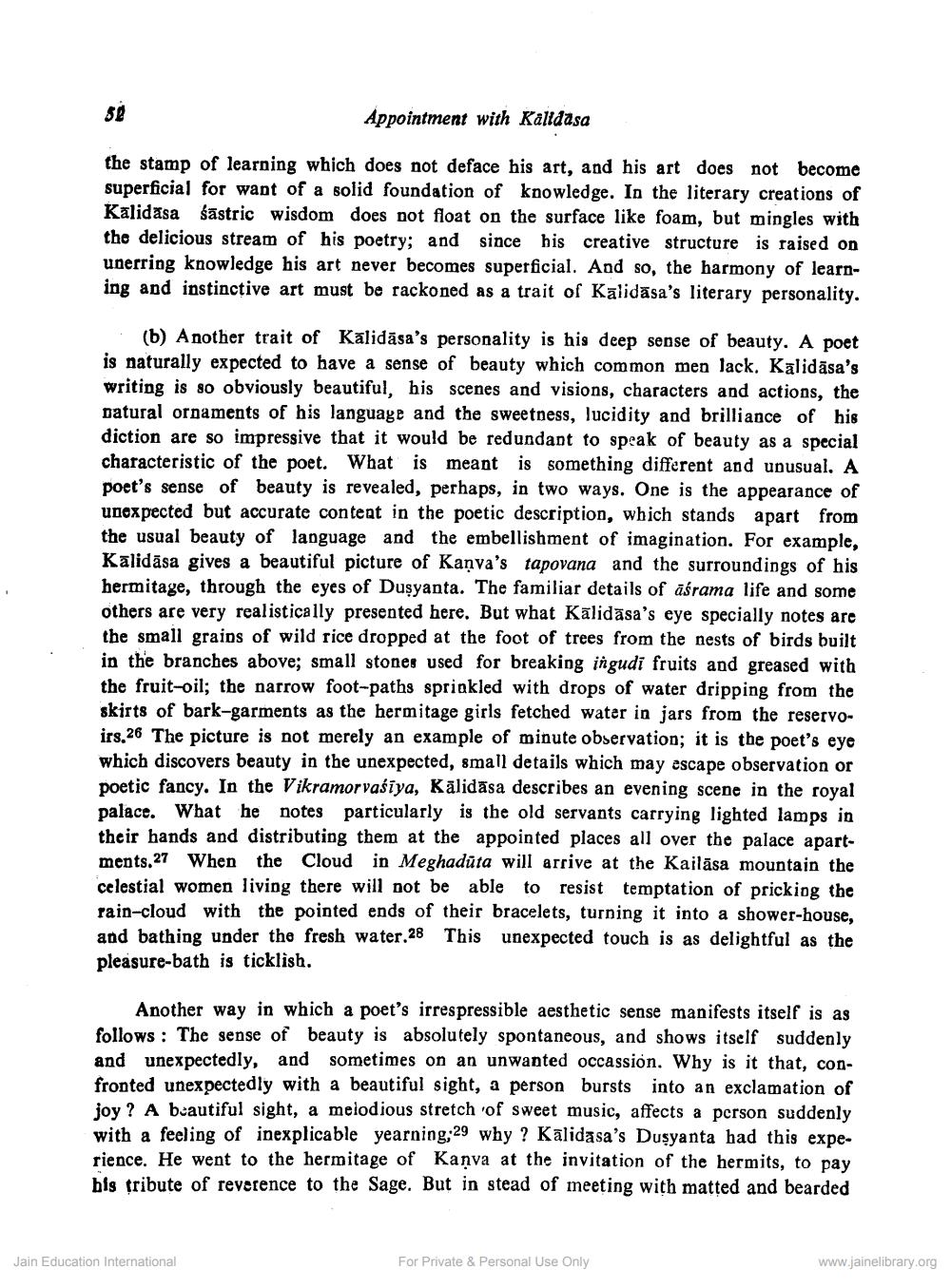________________
Appointment with Kalidasa
the stamp of learning which does not deface his art, and his art does not become superficial for want of a solid foundation of knowledge. In the literary creations of Kalidasa śāstric wisdom does not float on the surface like foam, but mingles with the delicious stream of his poetry; and since his creative structure is raised on unerring knowledge his art never becomes superficial. And so, the harmony of learning and instinctive art must be rackoned as a trait of Kālidāsa's literary personality.
(b) Another trait of Kālidāsa's personality is his deep sense of beauty. A poet is naturally expected to have a sense of beauty which common men lack. Kalidāsa's writing is so obviously beautiful, his scenes and visions, characters and actions, the natural ornaments of his language and the sweetness, lucidity and brilliance of his diction are so impressive that it would be redundant to speak of beauty as a special characteristic of the poet. What is meant is something different and unusual. A poet's sense of beauty is revealed, perhaps, in two ways. One is the appearance of unexpected but accurate content in the poetic description, which stands apart from the usual beauty of language and the embellishment of imagination. For example, Kālidāsa gives a beautiful picture of Kanva's tapovana and the surroundings of his hermitage, through the eyes of Duşyanta. The familiar details of aśrama life and some others are very realistically presented here. But what Kālidāsa's eye specially notes are the small grains of wild rice dropped at the foot of trees from the nests of birds built in the branches above; small stones used for breaking ingudi fruits and greased with the fruit-oil; the narrow foot-paths sprinkled with drops of water dripping from the skirts of bark-garments as the hermitage girls fetched water in jars from the reservoirs.26 The picture is not merely an example of minute observation; it is the poet's eye which discovers beauty in the unexpected, small details which may escape observation or poetic fancy. In the Vikramorvasiya, Kālidāsa describes an evening scene in the royal palace. What he notes particularly is the old servants carrying lighted lamps in their hands and distributing them at the appointed places all over the palace apartments.27 When the Cloud in Meghaduta will arrive at the Kailāsa mountain the celestial women living there will not be able to resist temptation of pricking the rain-cloud with the pointed ends of their bracelets, turning it into a shower-house, and bathing under the fresh water.28 This unexpected touch is as delightful as the pleasure-bath is ticklish.
Another way in which a poet's irrespressible aesthetic sense manifests itself is as follows: The sense of beauty is absolutely spontaneous, and shows itself suddenly and unexpectedly, and sometimes on an unwanted occassion. Why is it that, confronted unexpectedly with a beautiful sight, a person bursts into an exclamation of joy? A beautiful sight, a melodious stretch of sweet music, affects a person suddenly with a feeling of inexplicable yearning:29 why ? Kalidasa's Duşyanta had this experience. He went to the hermitage of Kanva at the invitation of the hermits, to pay his tribute of reverence to the Sage. But in stead of meeting with matted and bearded
Jain Education International
For Private & Personal Use Only
www.jainelibrary.org




